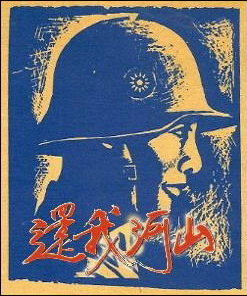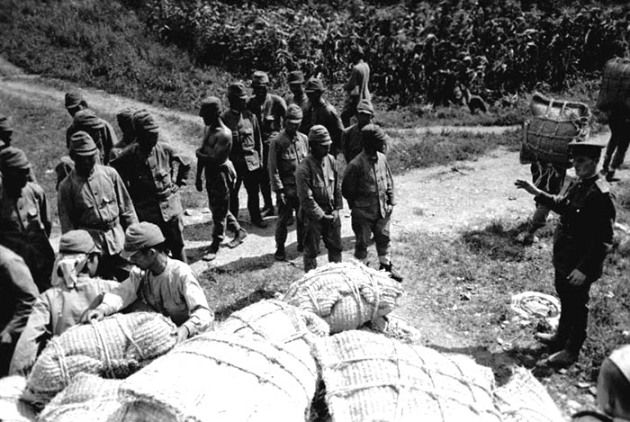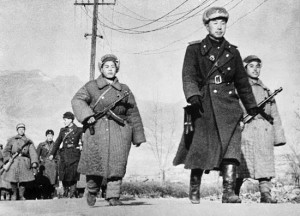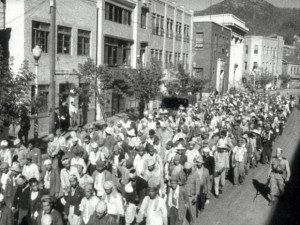The Fate of Japanese Settlers in Manchuria
- By Guest blogger
- 2 March, 2016
- 7 Comments
Large numbers of Japanese fell into Soviet hands at the end of World War Two. This happened to both soldiers (see photo above) and civilians. This article is part of a large online project — End of Empire — launched by the Nordic Institute of Asian Studies (NIAS). The idea is simple: To describe day by day the 100 days immediately after Hiroshima. This article, by Christian Hess, Associate Professor of Modern Chinese History at Sophia University, is reproduced with the kind permission of NIAS. Check out End of Empire here or the Facebook page here. The entire project has now also appeared in book form, see here.
In August 1945, as Japan’s empire abruptly collapsed, over three million civilians along with close to four million military personnel were living outside of Japan’s home islands. The experience of defeat would prove to be as diverse as the empire itself, and the process of protecting and returning this massive population to Japan would prove to be one of the more pressing issues for the victor nations of the Second World War. Returning to Japan and reintegrating into a destroyed, occupied, rapidly reconstituted nation-state would not prove easy.
In the once bustling port city of Dairen, which for 40 years served as a symbol of Japan’s imperial ambition and achievement as ‘Manchuria’s Gateway’, the days immediately following the war brought an eerie calm. The city had largely escaped the bombing that had so devastated cities in Japan, and Darien’s 200,000 Japanese residents, along with 600,000 Chinese, waited to see what the future would hold. That calm was shattered by the outbreak of sporadic fighting between Chinese and Japanese residents, and by the arrival of Soviet military units, which swept through Manchuria and reached Darien on 22 August.
Here, the Soviet military, which would remain in control until 1950, was responsible, along with their counterpart Chinese authorities, for the fate of the Japanese population. In the weeks after their arrival, the less disciplined Soviet troops indiscriminately raped and looted, and Japanese civilians were often the victim of these attacks. Many former Japanese military personnel were sent to Siberia, perhaps 750,000 in all and likely tens of thousands from Darien. Civilians faced an unknown situation, waiting for repatriation ships amidst the fear and anxiety of living in a now Soviet-occupied Chinese city swelling with Japanese refugees from Manchuria. Many of this latter population were born in the colonies, or had spent considerable portions of their lives in colonial cities like Dairen. What would life hold for them in occupied Japan? Could they stay where they had been living and working?
By choice or by order, industrial experts and advisors would in fact stay on in places like Darien for a number of years after the war. Here they not only provided technical assistance, but actively participated in Soviet and Chinese Communist-backed ceremonies and speeches, emphasizing the transformative power of socialism – a potent form of socialist internationalist propaganda which hammered home the theme that through socialism, imperialist enemies could become socialist friends.
The vast majority of Japanese however, would be repatriated to Japan in 1946 and 1947. Life since 1945 had been traumatic for Japanese civilians. Port cities like Darien swelled with refugees from Manchuria, many describing horrific scenes of fleeing both Soviet military violence and vengeance attacks from local Chinese. Many were forced to abandon children and were separated from family and loved ones. As their livelihoods collapsed with the empire’s end, many civilians had little to do but try and survive and wait their turn to board repatriation ships.
Little did they know that this was the beginning of a painful journey back ‘into’ Japanese society. In the reconstitution of Japan after 1945, those who had lived or were born in the colonies were now labeled ‘repatriates’ (hikiagesha), a politicized category that served to mark them out from the rest of the Japanese population. This operated both legally, as official identity documents used this label, but also in terms of social attitudes and behaviour. In the complex process of internalizing defeat, society itself heaped scorn on the repatriates, who came to symbolize betrayal and national shame. Their experiences served as reminders that the process of decolonization would have human costs both in the former colonial territories but also within the homeland itself, a process that would continue for decades after August 1945.






 Copyright © 2025
Copyright © 2025
For goodness sake this is a small world and the only world that all of us, yes, all of us, can stay. No one country or few countries should try to lord over other countries. Forget about politics and instead work on social and economics so that the whole world can progress as one helping one another instead of fighting each other. We should all condemn the use of military hardware. Best is to do away with all the military hardware, weapons and the like. No one country should own anymore weapon of mass destruction. We should be building a better world for generations to come. Wars, killing and politics are sickening.
A dangerously naive sentiment that assumes everyone in the world is just like yourself. They’re not.
“Those who beat their swords into ploughshares plow for those who keep theirs.”
— Benjamin Franklin
My father – in law was one of these ” repatriated ” from Manchuria. He wanted to stay in Manchuria and become a farmer there. He certainly would have done that should Japan had won the war.
I am sure that many Japanese stayed in Manchuria, not knowing where else to go. China was a favoured alternative policy as Darien was relatively calm after the war and Japan was in ruins and not welcoming to those coming from the ” colonies ” in China.
Some intermarried with the Chinese population. China presented more opportunities than a defeated Japan. Many Japanese soldiers were tired of the war and seeing the war from as far as Manchuria gave some a different perspective on the war. If the Soviets had not come and brutally harassed them, most Japanese would have stayed in China and would have embraced communism and nation building. These were dark times. Japan had committed many atrocities in China and the population was quite revengeful.
Manchuria is a vast province and some Koreans had adapted very well in China, keeping their culture and language. I suppose that the Japanese would have welcomed asylum. There are so many diverse ethnic groups in China, it is absolutely phenomenal. I go to China every year and I am always amazed at the multi-cultural aspect of the population.
By the year 1945, everybody was tired of fighting and most only desired to settle down where they were and where their children had been born.
Romy Kerwin
My mother lived in Mukden, now Shenyang, as a child when the soviets came. My grandfather bribed his way off a train to avoid capture from the soviet soldiers. He walked home for 3 days. On the 2nd day, the day before he arrived, the soviets rounded up all the male Japanese and supposedly sent to labor camps in Siberia. My grandfather ran a factory and my mom remembers having servants. She remembers leaving the house, which was 3 stories, and watching people move into the house. They were able to escape and make their way south to Darien and were able to make there way onto a ship. They were very lucky. My grandfather was able to only save one item. It was a picture of the house that my grandfather had built. I have a copy. One day, I would like to see if it is still there.
1945 is a darkest year in 20th century, what happened to Japanese in Manchuria the similar event took place in central Europe. How many millions of German civilians and families been ethnic cleansed out Pomerania, Silesia and Sudetenland either forced out or fled from the advancing Soviet Red Army?
Stalin’s boys did earned a good reputation of raping and looting through both in Europe and Northeastern Asia. It has been kept quiet by both Germans and Japanese because after all their political dictators started the war in the first place. I have no sympathy towards the Japanese population, just look what the Imperial Army did to Chinese population and in Southeast Asia even to Allied POWs.
My father, an officer in the US Army, was sent to China to assist US soldiers to learn to interact culturally with Chinese people, however, the US soldiers, in the end, were not sent to China. It was a time when the Japanese residents ( in Beijing) were fleeing and selling everything they could to soldiers for any money they could get. Consequently my father sent home many beautiful Japanese things. I know that he had dinner once with Madam Sun Yat-sen, one of the 3 sisters who married Chiang Kai Shek and his two brothers. I am most curious as to when that might have been, if there is any record of that US involvement in Beijing at that time, in the mid forties?
Dear Elena, this is the link to Beijing Foreign Affairs Office. You can try to write them an E-mail ask about this. I think they might direct you to the corresponding office.
http://www.bjfao.gov.cn